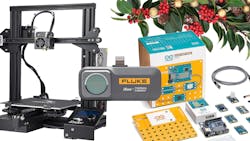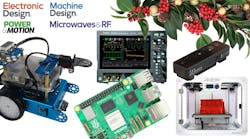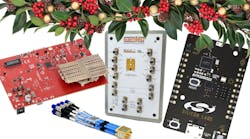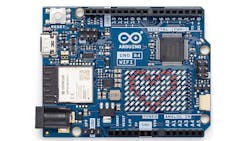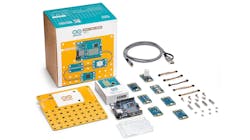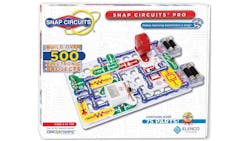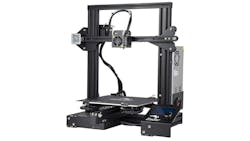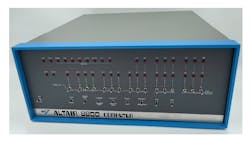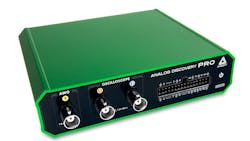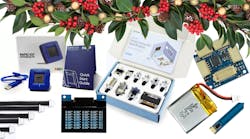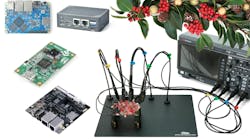Suggested Gifts for Electronics Nerds of All Ages
What you’ll learn:
- Gift-giving for engineers, kids, Makers, electronics hobbyists, or geeks becomes effortless with our suggestions, which include possible places to buy.
- Stocking stuffers can be had for as little as $10.
- Gift ideas for ages 5 to 108 address learning and new experiences as kits, tools, and reading materials.
Gift-giving isn’t an easy chore when the target of your generosity is that engineer, kid, Maker, electronics hobbyist, or geek who seems to already have everything. To avoid that old standby of socks or a sweater, here’s a take on some ideas for electronics-related gifts to give your technology-oriented loved one for the holidays, birthday, anniversary, or “just because.” Note that all of the example pricing is at the time of this writing and could change either way, as can availability of the item.
More Gift Guide Ideas
Under $50
One thing that’s not a big hit on the pocketbook, but will garner a smile from any gift-receiving geek, is an Arduino "shield" or board. There are many choices here, from the original Arduino Uno to the more compact Arduino Nano.
Arduino has a rich community of developers and an environment of learning resources and libraries that makes programming easy. The software development tools are available at no cost. The Arduino hardware is open source, and though an Arduino Uno R3 “clone” can be bought for as little as $10, a much more capable genuine Arduino Uno R4 WiFi board includes the ability to use Wi-Fi, Bluetooth, and USB connectivity—and it’s 5 V friendly (Fig. 1). The board is available from the Arduino store for about $28 shipped. These, or the more compact Arduino Nano at about $25, also make great stocking stuffers.
For complete beginners, take a look at Elenco’s Snap Circuits. Available in a vast array of kits, anyone who can button up the snaps on a jacket can build circuits, with no special tools required. The kits start at below $25 for the beginners’ kits, with those being suitable for ages 5-9. From there, they increase in complexity, including things like FM radio kits.
One interesting Snap Circuit kit that’s Lego-compatible claims to be “suitable for ages 8 to 108” and sells for around $29. Sneak up on those gamers, in the same age range, by making them learn electronics with the Arcade kit for about $45.
For the ASIC (“chip”) designer near and dear to your heart, classical textbooks by Rezavi and by Franco are also available in this price range.
Gifts Between $50 and $150
Taking the Arduino game up a notch is the Arduino Plug and Make kit at about $89 (Fig. 2), which includes the Arduino Uno R4 WiFi board, as well as a number of sensor boards that make exploration and invention of IoT and other widgets, with controls and readouts possible over Wi-Fi, the cloud, and by a smartphone. Read more about it in Electronic Design’s article.
Likewise, Elenco’s Snap Circuits kits can be taken to another level in this price range. They include hundreds of projects possible within one kit—the 500 project kit (Fig. 3), selling for about $85.
Rather than simply connect circuits by snapping them together from instructions, the $73 Fundamental Analog Circuits & Semiconductors book teaches readers by starting from basic components and progresses to building functional circuits using breadboards and test equipment. More details, including copies of the table of contents, are in this Electronic Design article.
A “kit” that includes the book and all of the components needed to execute all of the book’s exercises is available for $124. There’s also a complete set of lab equipment available as a $220 adder to the kit. It has a power supply, small oscilloscope and function generator, multimeter, breadboard, some wire, and a few other components.
If that’s a bit too fundamental, gift an addition to your favorite ASIC designer’s library with classic IC design textbooks by Baker at $129 and by Grey et al at $120. Or for pretty much anyone into electronics circuits, there’s the generalists’ electronics go-to reference book by Horowitz & Hill, The Art of Electronics for $102.
Any Maker, hobbyist, engineer can use a 3D printer to build real things out of plastic, or even metal. A good starter machine is the Creality Ender 3 (Fig. 4). It can be had on eBay as a refurbished item by Creality for under $100 with coupon, or about $119 if a coupon is inactive. Or it can be found on Amazon if you want a new, easily returned, item.
Don’t forget to include a roll of “PLA” filament, 1.75 mm in diameter and on a 1-kg spool. Stick to basic colors, since exotics like glow-in-the-dark, metal, and carbon-fiber-infused filaments are abrasive to the stock brass extruder nozzles. Hardened nozzles are available to enable 3D printing of these materials, though.
Gifts Under $500
The Altair-Duino (Fig. 5) includes everything needed to build a fully functional emulator of the historic Altair 8800 computer. Included is an SD card with disk images of Altair DOS, Altair BASIC, CP/M, and Time-Sharing BASIC. A kit version requiring soldering skills sells for about $230, with a fully-assembled version going for around $480. Both are allegedly available November 2024 and will likely sell out quickly as they have in the past.
Another “retro” kit that requires soldering skills is a neon (“Nixie”) tube clock kit. Many are available when searching, but this one for about $175 has the mix of a haphazard and art aesthetic to it that makes it interesting. The kit does run at 170 V under its removable glass cover, so take that into consideration before buying.
The Cat S62 Android phone is waterproof to 5 feet, features an integrated (−20 to +400°C) FLIR Thermal camera, and sells for about $365. Or augment your gift recipient’s existing phone with a plug-in thermal camera from Fluke—the TC01B (Fig. 6). Unlike the FLIR phone plug-in thermal cameras that cost less, it features temperature measurement to 500°C/932°F and higher resolution at 256 × 192 pixels for about $494. The TC01B is available for iPhone or for Android smartphones.
Digilent’s Analog Discovery 3, ranging between $379 and $429, is a USB-based, two-channel oscilloscope that also features a couple of programmable power supplies, analog I/O, and 16 digital inputs and 16 digital outputs that enable operation as a logic analyzer.
Gifts Under $1,000
Treat your reasonably savvy electronics designer friend to Matt Venn’s Zero to ASIC course, which includes a dedicated space on real silicon for a customer chip designed in the course for about $650. There’s no greater flex than to be able to claim having designed, taped out, and received a custom-designed chip. The design methodology uses free, open-source tools; their installation is described in this Electronic Design article.
Most community colleges offer both credit and non-credit continuing education courses in engineering, programming languages, shops, crafts, art, and other interesting subjects. Browse the course catalogs, and handwrite your own “gift certificate,” with expiry date, for the college tuition.
For the older ones in your life, some schools offer significant discounts for seniors’ tuition, so pry them away from the TV by getting them to clip your handmade tuition gift coupon. Nothing gets done without deadlines, so think about putting an expiry date on it.
A nice piece of equipment for the lab/shop of any electronics enthusiast is the $749 Digilent ADP 2230 (Fig. 7), which can be thought of as Analog Discovery 3’s big brother. It increases the two-input channels’ bandwidth from 9 to 50 MHz and provides deep memory buffers to store captured waveforms.
Digilent provided an ADP2230 a few months ago on request. It’s the oscilloscope connected by USB cable to the laptop that’s showing the attractor waveforms as X-Y mode traces in this Electronic Design article.
Pro-tip...Digilent has discounts that hit your text messages every Tuesday if you sign up for those, so it’s possible to score a bit of a discount on all of the company’s products with a little patience and planning ahead.
Happy Holidays,
AndyT
Andy's Nonlinearities blog arrives the first and third Monday of every month. To make sure you don't miss the latest blog edition, new articles, or breaking news coverage, please subscribe to our Electronic Design Today newsletter.
More Holiday Gift Ideas
About the Author
Andy Turudic
Technology Editor, Electronic Design
Andy Turudic is a Technology Editor for Electronic Design Magazine, primarily covering Analog and Mixed-Signal circuits and devices and also is Editor of ED's bi-weekly Automotive Electronics newsletter.
He holds a Bachelor's in EE from the University of Windsor (Ontario Canada) and has been involved in electronics, semiconductors, and gearhead stuff, for a bit over a half century. Andy also enjoys teaching his engineerlings at Portland Community College as a part-time professor in their EET program.
"AndyT" brings his multidisciplinary engineering experience from companies that include National Semiconductor (now Texas Instruments), Altera (Intel), Agere, Zarlink, TriQuint,(now Qorvo), SW Bell (managing a research team at Bellcore, Bell Labs and Rockwell Science Center), Bell-Northern Research, and Northern Telecom.
After hours, when he's not working on the latest invention to add to his portfolio of 16 issued US patents, or on his DARPA Challenge drone entry, he's lending advice and experience to the electric vehicle conversion community from his mountain lair in the Pacific Northwet[sic].
AndyT's engineering blog, "Nonlinearities," publishes the 1st and 3rd Tuesday of each month. Andy's OpEd may appear at other times, with fair warning given by the Vu meter pic.
